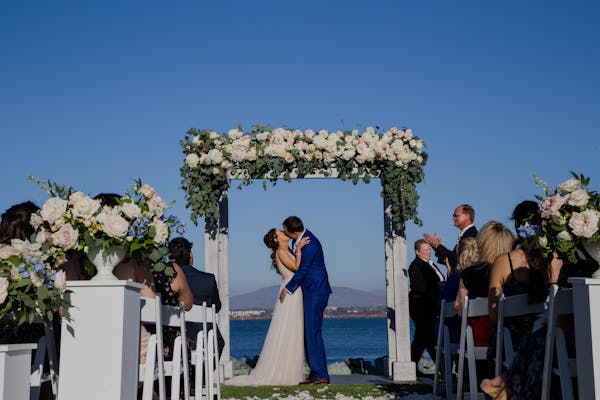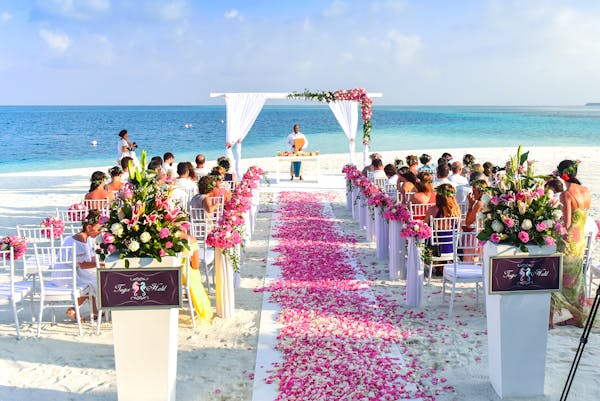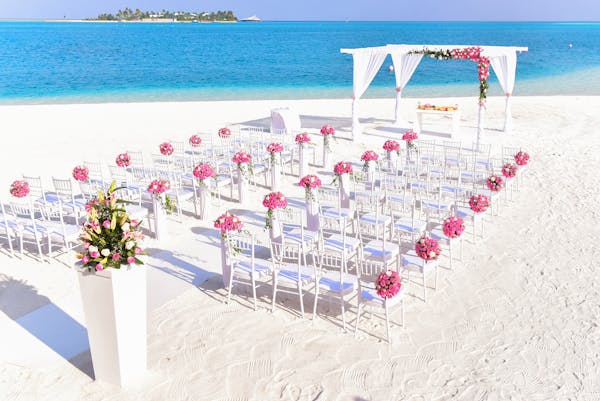
Planning a wedding requires dedication and effort, regardless of the time or location. While organizing a beach wedding may entail unique considerations compared to traditional venues, it’s an opportunity to create a memorable experience against a stunning backdrop. Don’t be discouraged by the added complexities; exchanging vows by the ocean will make it all worthwhile. We’ve sought advice from experienced beach wedding planners to provide you with invaluable tips, whether you’re beginning the planning process or seeking last-minute guidance. Once you’ve sorted out the logistics, you can dive into browsing inspiration and saving your favorite beach wedding ideas.
How to Plan: The Beach Wedding Ideas
Are you ready to embark on your beach wedding journey? Here’s a step-by-step guide to tying the knot on the shore and everything you need to consider when planning your beach wedding.
Establish a comprehensive budget.
Begin your beach wedding planning journey by setting a detailed budget. While the allure of a beach wedding may be strong, it’s essential to have a clear understanding of your financial parameters. Your budget serves as a roadmap, guiding you through the planning process and ensuring that your dream wedding remains within reach.
Creating a budget allows you to assess the financial landscape and identify the venues and vendors that align with your financial resources. Consider factors such as venue fees, vendor costs, permit expenses, furniture rentals, and attire when crafting your budget. Having a well-defined budget provides clarity on how much flexibility you have for various costs, allowing you to make informed decisions throughout the planning process.
Moreover, your budget serves as a tool for prioritization. Determine whether you prefer venues that offer beach wedding packages, which can provide cost savings and streamline planning logistics. Alternatively, you may opt for a customized approach by hiring vendors à la carte to curate a unique and personalized experience tailored to your preferences.
By setting a comprehensive budget at the outset of your planning journey, you lay a solid foundation for a seamless and stress-free beach wedding experience.
While hiring a wedding planner represents an additional investment, their expertise is invaluable, particularly when it comes to planning a beach wedding. A seasoned wedding planner possesses the knowledge and experience to navigate the unique challenges and considerations associated with beach weddings, ensuring a smooth and seamless planning process.
One of the primary benefits of engaging a wedding planner is their ability to allocate your budget effectively. They possess a keen understanding of the various expenses involved in beach weddings, including costs that may have yet to cross your mind, such as generators and sound equipment. By leveraging their expertise, a wedding planner can help you prioritize your spending and make informed decisions to maximize your budget.
Furthermore, a wedding planner serves as a valuable resource for sourcing reputable vendors and coordinating logistics. From securing permits and arranging transportation to managing setup and breakdown, their meticulous attention to detail ensures that every aspect of your beach wedding is meticulously planned and executed.
Ultimately, while investing in a wedding planner may entail an upfront cost, the peace of mind and reassurance they provide throughout the planning process are priceless. With their guidance and expertise, you can confidently embark on your beach wedding journey, knowing that every detail is expertly managed and curated to perfection.
Select your dream destination and venue.
Choosing the perfect destination and venue is a pivotal step in planning your beach wedding. Whether you already have a specific location in mind or are open to exploring options, this decision sets the stage for your unforgettable day.
If you’ve already envisioned your dream beach wedding locale, you can proceed to this step with confidence. However, if you’re still exploring possibilities, begin by compiling a shortlist of potential beach wedding venues that capture your imagination.
Consider whether you’re willing to travel abroad for your wedding or prefer to keep the celebration closer to home. Destination weddings in exotic locales like Cancun or the Caribbean offer a picturesque backdrop but may entail passport requirements and international logistics. Alternatively, opting for a domestic beach wedding allows for easier travel arrangements and familiarity with local regulations.
When narrowing down your venue options, pay careful attention to seasonality and weather patterns. For instance, planning a beach wedding during the summer months in hurricane-prone regions carries potential risks. Similarly, while escaping the winter chill with a Hawaiian wedding may seem idyllic, be mindful of the state’s rainy season from October to April.
Additionally, consider the off-season implications for your chosen destination. While a beach wedding during the shoulder season may offer cost savings and fewer crowds, it could also present challenges in securing vendors and accommodations.
By carefully weighing these factors and conducting thorough research, you’ll be well-equipped to select the destination and venue that perfectly aligns with your vision for a magical beach wedding.

Investigate permits and essential logistics.
Before diving into the details of your beach wedding, it’s crucial to familiarize yourself with the local requirements for outdoor events. Laura Kaatze, a seasoned wedding planner at Tide the Knot Beach Weddings in Tampa, Florida, emphasizes the importance of obtaining permits for beach ceremonies. Permits are often mandatory for hosting events on the sand and typically incur fees ranging from $250 to $450, particularly for private beaches and protected waterfront areas like nature sanctuaries or residential neighborhoods.
Specializing in beach wedding planning, vow renewals, and elopements, Kaatze’s team adeptly manages permit logistics, incorporating associated costs into the couple’s final invoice—a service commonly offered by wedding planners. While permits grant access to designated areas, it’s essential to note that public beach access cannot always be restricted, even with a license. Kaatze reassures couples that, in her experience, beachgoers have never disrupted the serene ambiance of their weddings. To enhance privacy, she advises selecting an optimal day or time of year when beach crowds are minimal, ensuring a tranquil ceremony.
In addition to securing permits, couples must adhere to local regulations regarding noise and light emissions. This includes considerations such as minimizing light pollution during sea turtle nesting season or near migratory bird habitats. Furthermore, it’s essential to accommodate any guests with accessibility needs by arranging temporary ramps or walkways on the sand, ensuring an inclusive and seamless experience for all attendees.
Refine your theme, décor, and beyond.
With beach wedding venues often serving as blank canvases, particularly when exchanging vows directly on the sandy shores, couples are presented with ample opportunities for creativity. Samantha DeFeo and Taylor Williams, co-owners and event planners at Coastyle Weddings & Events in the Outer Banks, highlight the versatility of beach settings.
“They emphasize that it grants couples the ability to customize the appearance of their wedding ceremony genuinely.” “From minimalist elegance to extravagant luxury, the stunning backdrop of the beach offers endless possibilities. Additionally, the natural beauty of the surroundings provides a picturesque backdrop for capturing memorable moments.”
As you finalize your wedding theme and décor, consider incorporating elements that complement the coastal ambiance. Seashells, driftwood, and nautical accents can add a touch of seaside charm to your ceremony and reception décor. Embrace the natural hues of the beach, opting for soft pastels or vibrant blues to enhance the coastal aesthetic. Whether you envision a laid-back beach chic affair or a lavish seaside soirée, the flexibility of beach venues allows you to bring your unique vision to life.
Furthermore, the scenic beauty of beach weddings provides an ideal backdrop for capturing stunning photographs that will be cherished for a lifetime. With the sun-kissed shoreline and shimmering ocean waves as your backdrop, your wedding album is sure to showcase the magic and romance of your beach wedding celebration.
Infusing vibrant colors into your beach wedding can add a lively and energetic atmosphere to your special day, creating a captivating ambiance that complements the bright sunshine. For couples embracing a nautical theme, drawing inspiration from sailing flags can guide your color palette selection. Opt for bold hues such as red, navy blue, green, and yellow to evoke the spirit of the sea and add a playful touch to your décor.
Alternatively, for a more refined and sophisticated aesthetic, consider incorporating pastel tones and neutrals that seamlessly blend with the natural beauty of the beach scenery. Soft hues like blush pink, seafoam green, and sandy beige exude elegance and chic simplicity, enhancing the tranquil ambiance of your coastal celebration.
While selecting décor is undoubtedly an enjoyable aspect of beach wedding planning, it’s essential to consider practical elements unique to outdoor venues. Unlike traditional indoor settings, beach weddings require careful consideration of technical details to ensure a seamless event experience. Be prepared to address logistical challenges such as providing shelter for guests to shield from the elements and ensuring an adequate power supply for lighting and audio equipment. By proactively addressing these logistical considerations, you can create a memorable beach wedding that combines aesthetic charm with practical functionality, ensuring a truly unforgettable celebration for you and your guests.
Secure lodging and travel arrangements.
Unless you’re fortunate enough to reside in close proximity to your beach wedding venue, organizing travel logistics and arranging accommodations for the duration surrounding your weddings is essential. It’s advisable to commence this process well in advance, particularly if your chosen destination is a sought-after tourist hotspot or popular vacation retreat.
Booking accommodations and coordinating travel plans in advance ensures availability and helps alleviate last-minute stressors. Additionally, providing ample notice to your guests allows them sufficient time to make their arrangements. Consider sending out save-the-date cards at least six months prior to your wedding date. For destination weddings in far-flung beach locales, extending the notice period to eight months or even a year in advance provides guests with ample time to plan and prepare.
In addition to lodging and travel, consider any pre-wedding events you may wish to host, such as a rehearsal dinner or welcome drinks. Making arrangements for these gatherings well in advance ensures a seamless and enjoyable experience for you and your guests, allowing everyone to fully immerse themselves in the celebration of your love amidst the sun-kissed shores of your chosen beach destination.
Establish contingency measures.
Despite meticulous planning, unforeseen circumstances may arise on your wedding day—this is entirely normal. Beach weddings, in particular, are susceptible to variables such as inclement weather, high tides, or heat waves, which may deviate from your original plans. However, with proactive preparation, you can mitigate potential disruptions and ensure a seamless celebration.
For peace of mind, collaborate with your wedding planner or venue coordinator to develop contingency plans, including both primary and backup options. Consider devising multiple backup strategies, such as Plan B and even Plan C, to address various scenarios that may arise. These contingency plans should account for adverse weather conditions or other unforeseen challenges that could impact your beach wedding arrangements.
Once contingency plans are finalized, communicate them to your vendor team, as well as friends and family involved in the planning process. Transparency and clear communication are key to ensuring everyone is informed and prepared to execute alternative arrangements if necessary. Additionally, consider including a brief note on your wedding website to inform guests of the possibility of inclement weather and reassure them that you will provide updates should any changes to the original plans occur. By proactively addressing potential challenges, you can navigate any unexpected circumstances with confidence and grace, ensuring a memorable and stress-free beach wedding experience for all involved.

Organize post-wedding cleanup.
While many venues provide in-house staff to assist with cleanup after the festivities, this may be different for weddings held on public beaches. If you’re tying the knot on a sandy shoreline without access to venue staff, it’s essential to plan for post-wedding cleanup.
In the absence of onsite assistance, designate responsibility for tasks such as trash removal, decor dismantling, and ensuring the beach is left pristine. While certain vendors, such as caterers and entertainment providers, may manage their equipment, coordinating the remaining cleanup efforts falls to you and your designated team.
Consider enlisting the assistance of a wedding planner to oversee these logistics and ensure a seamless transition from celebration to cleanup. A professional planner can coordinate with vendors, manage breakdown tasks, and ensure that no items are inadvertently left behind on the beach.
By proactively addressing post-wedding cleanup arrangements, you can conclude your beach wedding festivities with ease and leave behind only cherished memories of your special day.
Conclusion:
When tying the knot at an oceanfront location, additional coordination is essential. Follow these tips and do not get too overwhelmed; instead, make the most of your moment, relax, and enjoy the time-being. Remember, it’s once in a lifetime event.














